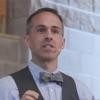Joshua Pauling (JP): Thank you, Sam, for agreeing to discuss the power of story, and your stories, too. You’ve written a best-selling adventure series The Green Ember, (which my children love, by the way) and now a new book Jack Zulu and the Waylander’s Key, co-authored with your son, Josiah. To start, tell me a little about your background and what sparked your interest in writing stories.
S. D. Smith (SS): Thank you. I’m a West Virginia boy who grew up in the hollers and hills of the mountain state. When I was twelve, our family moved to South Africa as missionaries. I turned thirteen in South Africa the day Nelson Mandela was released from prison and when I left to return home, he was the president. My wife, Gina, and I were married in 2000 and have four children. I told stories to my kids about heroic rabbits battling evil wolves and birds of prey. They enjoyed them and begged me to write them down. I did, and we shared those stories with others, and many people liked them the way we did. Thus, I was given a cool new career.
JP: From bedtime stories to bestselling series—that’s quite a story in itself. Did you ever envision the runaway success of The Green Ember Series—a series about rabbits with swords? What is it about this series that has resonated so deeply with so many?
SS: I didn’t expect what happened, no. I think they work for kids because of the adventure and action and because they are books that take kids seriously. These stories are dangerous and don’t talk down to them, but they are also deeply virtuous and noble. I think parents love them because of the deep themes, the longing for a Mending and keeping faith amid chaos. They are kind of working on two levels. We have heard from lots of moms who say they are weeping for joy at the same time the kids are leaping for joy. That kind of sums up the reaction of many families.
JP: Tell us a little bit about your new book Jack Zulu and the Waylander’s Key.
SS: It’s a story about gratitude and wonder. I call it a Chestertonian rural fantasy. It’s fun, set in the 80s, and involves traveling between realms, and a powerful villain, and friendship, and humor, and many things. But at bottom it’s about the virtue of receiving and seeing.
JP: Can you elaborate more on your approach to storytelling and the power of story in human formation?
SS: Lewis said the imagination is the organ of meaning. Stories are where we form our affections in a way that no other capacity allows. Not our intellects, certainly. We need all these capacities, but I think Christians who care deeply about truth can sometimes miss the most effective way of internalizing and—most importantly—loving truth. Stories. Stories that are faithful to the truth. Heidi Johnston says that these faithful stories aren’t an escape from reality, but an escape into reality. The best stories don’t subtract truth, they add meaning.
JP: In a culture that provides countless competing and alluring stories and narratives about life and human identity, how do we make the Christian story the most compelling of all?
SS: I wish I knew the big answer, but the small answer for me is doing the next right thing. The next faithful step. I am focused on radical generosity to kids who are desperate for what only Christ can give. I am intent on prayer and faithful storytelling as a modest but defiant act against the spirit of the age. I aim to build in quality and care and an openness to be ready to say yes when God calls us to take our work to more families. I can’t solve it all, but I can say yes to Jesus in my writing.
JP: I like that—faithful storytelling as a defiant act against the spirit of the age. Well-stated. I’ve heard you talk about “story math” before. Could you explain this concept? How do you use story math without it seeming trite or simplistic—or too predictable?
SS: My understanding is probably pretty simplistic, because formulas aren’t really my method. But I do get a sense of the clicking into place, the logical and emotionally satisfying resolution we long for in stories. It’s about set ups and payoffs, and I just think of it in those terms. There’s a two at the beginning and there’s a four at the end. The book is about that two in between. Is that story math? Maybe!
JP: My family and I recently attended one of your book launch events for Jack Zulu and the Waylander’s Key. I was struck by the sheer joy of the audience as we laughed together, as we listened to a portion of the new book read aloud, and as we sang some of the songs from the pages of The Green Ember Series, led by you and your family playing guitar and singing. What is it like to have a crowd of people singing songs from your stories, and doing so alongside your family, to boot?
SS: It’s special. To share a little of our own family’s story with other families is a gift. There’s a special bond between us and the audience and I feel that every day, whether at an event or not. (But I love seeing the faces and getting high-fives!) It’s been a profound honor to be welcomed into so many hearts and homes. I feel like blessing a kid is the best thing I can do, and I am continually blessed in return by their love and support. I’m amazed at the number of letters I’ve received from children that end with, “I’m praying for you.” I’m deeply grateful.
JP: One more question, as we conclude. Modern Reformation aims to help its readers think theologically about all of life. How do we think theologically about stories?
SS: The most concise doctrines are rooted in stories. The statements of theological import, like “God is powerful” are meaningless apart from stories. What does it mean to be powerful? When we get the creation or the parting of the Red Sea, we see and understand power. When Jesus calms the sea and raises the dead, we see the power and the statement of truth has meaning. I think it’s impossible to think theologically at all without being immersed in stories, because the Bible is teeming with them and because the world is teeming with them, and God is at the back of it all. Evaluating stories in light of God’s revealed story is like flipping the lights on. The Christian worldview is, contra the critics, an incredibly comprehensive approach that accounts for reality faithfully and makes sense of all kinds of stories. Again, see the Bible. I believe we should receive stories as living things, not as cadavers to be dissected. But we should bring our brains to the experience and use that God-given capacity of intellect to help our hearts receive the gifts that stories can be, and discern when they are shaping us more toward death than life. And we should choose the way of life again and again.
JP: Thank you, Sam, for your time, and thank you for helping others choose the way of life through your stories.
S. D. Smith is the author of The Green Ember Series, a million-selling adventure saga that spent time as the number one bestselling audiobook in the world on Audible. His newest novel, co-authored with his sixteen-year-old son, is a thrilling fantasy called Jack Zulu and the Waylander’s Key. Smith’s stories are captivating readers across the globe who are hungry for “new stories with an old soul.” Smith is a founder and owner of Story Warren, a publishing, events, and IP development house based in rural West Virginia. Story Warren exists to serve families as “allies in imagination.”
Joshua Pauling taught high school history for thirteen years and is now a classical educator and furniture-maker. He is head elder at All Saints Lutheran Church (LCMS) in Charlotte, North Carolina and studied at Messiah College, Reformed Theological Seminary, and Winthrop University. In addition to Modern Reformation, Josh has written for Areo, FORMA, Front Porch Republic, Mere Orthodoxy, Public Discourse, Quillette, Salvo, The Imaginative Conservative, Touchstone, and is a frequent guest on Issues, Etc. Radio Show/Podcast.




